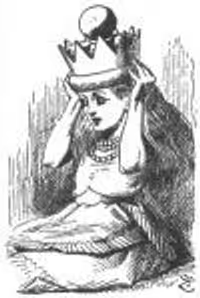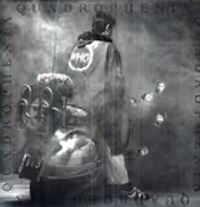Musicals that have aged poorly with time?
#150Musicals that have aged poorly with time?
Posted: 3/31/16 at 11:45am
Sorry I missed the sociopath reference.
There isn't a whole lot of humor on this board, at least humor that isn't at the expenses of someone else, so when I find something funny it goes right past me.
Nice to see so much interest in and knowledge of the early musicals that started this Broadway phenomenon.
Nick (Spoken): What the hell are musicals?
Nostradamus (Spoken):
It appears to be a play where the dialogue stops
And the plot is conveyed through song
Nick (Spoken): Through song?
Nostradamus: Yes.
Nick: Wait, so an actor is saying his lines and out of nowhere he just starts singing?
Nostradamus: Yes.
Nick:
Well that is the
(Singing) Stupidest thing that I have ever heard
You're doing a play, got something to say
So you sing it?
It's absurd
Who on earth is going to sit there while an actor breaks into song
And what possible thought could the audience think
Other than "This is horribly wrong"
Mikeacarroll
Swing Joined: 8/20/10
#151Musicals that have aged poorly with time?
Posted: 3/31/16 at 1:09pm
Absolutely! Couldn't agree with you more about Finian's Rainbow, especially the last iteration a few years ago. I saw better productions in High Schools than that tripe.
Updated On: 3/31/16 at 01:09 PM#152Musicals that have aged poorly with time?
Posted: 3/31/16 at 4:07pm
...I did mean OK the show, Gaveston...
I think Oklahoma! has a better *constructed* book than Show Boat's where the mix of traditional musical comedy (especially in the original script--of course Show Boat has had 36 or so different scripts) feels quite awkward. I still personally prefer Show Boat (slightly) but...
As for Oklahoma! one issue I have with the Nunn revival (to which he *added* new dialogue--although perhaps it was taken from Green Grow the Lilacs) was he tried to play up the dark elements (the setting is almost a dustbowl). I admit the quick way Judd is gotten rid of and normality is restored always struck me as odd. Still, that NCU reconstruction of the original production that was filmed speaks volumes for the original production still playing well. I'd rather watch it than the Hugh/Nunn DVD anyday.
#153Musicals that have aged poorly with time?
Posted: 3/31/16 at 7:25pm
Many would agree that the first act of Show Boat is near perfect, but the second act is kind of "do it yourself." There was a short list of items that had to be in it, but you had a lot of leeway after that. On that list: Gaylord had to leave a pregnant Magnolia, Julie has to sing "Bill" (because it's so popular), Gaylord and Magnolia have to reunite after some time between two and twenty years and there had to be a big closing production number with Kim. Maybe a few more - Magnolia singing "After the Ball" to her father - but it's pretty open and you even have an excess of songs written for the show that you can pick and choose from.
But the plot of Oklahoma is lighter than a falling leaf.
What would have happened if Oklahoma had been a box office flop? No Carousel?, No South Pacific? No West Side Story? No mentor for Sondheim? Stupid question.
#154Musicals that have aged poorly with time?
Posted: 3/31/16 at 7:32pm
I'm not sure we can argue about the first act of SHOW BOAT being perfect because there are about 800 different versions of the first act of SHOWBOAT.
I don't think you can even compare SHOWBOAT to OKLAHOMA because OKLAHOMA has a set script and score and SHOWBOAT (following the example of musical theatre in the 1920s) never had a set score or script. Every time it has been revived the material is different. SHOWBOAT is remembered as important mostly because of its powerful (and controversial) story line and the score. Of course its also true that several of the songs in SHOWBOAT were standards of the time and not written for the musical.
#155Musicals that have aged poorly with time?
Posted: 3/31/16 at 8:50pm
Amazing how attitudes about some o these shows have changed in my time away from these boards. If you were, for example, to suggest that RENT was anything less than perfection in its initial run, the proverbial pitchforks and torches would be raised.
To be crushingly honest, I dont think a lot of the R&H canon will survive to the end of the current century. As others have noted, all of them are a bit creaking to begin with, and unless R&H themselves were more brilliantly subversive than one might think in exploiting attitudes about women and minorities, we might instead get revues of their songbook instead.
Most of the 60s and 70s? A few might survive as curiosity pieces, but that's about it. HOW NOW DOW JONES has some great songs ("Rich is Better"![]() and a theme that could still still play today, but it would need so much work to make it worthwhile. I noted that FALSETTOS is getting a revival: I would suggest seeing it now, because it too is starting to show a few cracks in the patina.
and a theme that could still still play today, but it would need so much work to make it worthwhile. I noted that FALSETTOS is getting a revival: I would suggest seeing it now, because it too is starting to show a few cracks in the patina.
Bottom line: I dont think any show will last much in perpetuity, not even (gasp!) WICKED or (horrors!) SPRING AWAKENING (which IMHO has a seriously tedious score when performed now). I may personally love WHAT MAKES SAMMY RUN, but even staging it as a period piece would drastically short sell its virtues.
#156Musicals that have aged poorly with time?
Posted: 3/31/16 at 10:01pm
How Now never really ran though--so I'm curious as to your comment (I think I'm missing some joke :P )
I think the R&H shows will survive--their are creakier operettas and, even operas that have. I doubt they will be revived even a fraction as often as they are now, but... Maybe we'll have a bunch of fan companies for R&H the way we do for Gilbert and Sullivan...
#157Musicals that have aged poorly with time?
Posted: 3/31/16 at 10:03pm
Well what will also become interesting is that in this century, the R&H catalogue will enter into the public domain, which means that future artists will be able to take the bones of their work and freely adapt it anew to speak to audiences in 'their time.'
#158Musicals that have aged poorly with time?
Posted: 3/31/16 at 11:13pm
OlBlueEyes said: "Sorry I missed the sociopath reference.
There isn't a whole lot of humor on this board, at least humor that isn't at the expenses of someone else, so when I find something funny it goes right past me.
Nice to see so much interest in and knowledge of the early musicals that started this Broadway phenomenon.
"
I don't know what you mean by "missed the reference". You mentioned it again in post #134.
But if you recognized that I was being ironic, I am glad. You've done nothing to earn any unkindness from me (or anybody else as far as I can tell). I too enjoy these discussions with posters who are thoroughly familiar with the history and literature of musical theater. I don't want to condescend, but sometimes it's hard to have a conversation with someone whose only points of comparison are WICKED and LEGALLY BLONDE. (I haven't seen either show, so it's not my intent to denigrate them here. I'm only talking about frame of reference.)
#159Musicals that have aged poorly with time?
Posted: 3/31/16 at 11:27pm
Love South Pacific, but I think the depiction of racism is lost on the current generation.
#160Musicals that have aged poorly with time?
Posted: 4/1/16 at 4:46am
QueenAlice said: "I'm not sure we can argue about the first act of SHOW BOAT being perfect because there are about 800 different versions of the first act of SHOWBOAT.
I don't think you can even compare SHOWBOAT to OKLAHOMA because OKLAHOMA has a set script and score and SHOWBOAT (following the example of musical theatre in the 1920s) never had a set score or script. Every time it has been revived the material is different. SHOWBOAT is remembered as important mostly because of its powerful (and controversial) story line and the score. Of course its also true that several of the songs in SHOWBOAT were standards of the time and not written for the musical.'
Are you familiar with John McGlinns massive 3 CD set of all the songs ever written for Show Boat?
John McGlinn's sprawling, monumental three-CD set is about all the Show Boat any listener could ever ask for. In an obvious labor of love, McGlinn reconstructs the show as it ran on opening night, November 15, 1927, including every song, the original orchestrations, and all underscored dialogue.
McGlinn died in 2009, amid great praise for all the work he had done in tracking down and restoring vintage musicals. Show Boat was his greatest passion. So if you want to know the original score of Show Boat on opening night, with original arrangements, this will get you there, or at least very close.
http://www.amazon.com/Kern-Hammerstein-Frederica-Sinfonietta-Ambrosian/dp/B000I2ISLS/ref=sr_1_9?s=music&ie=UTF8&qid=1459496457&sr=1-9&keywords=showboat
You say, SHOWBOAT is remembered as important mostly because of its powerful (and controversial) story line and the score.
Well, what else would a musical, or an opera be remembered for other than story and score? Show Boat, approaching its 90th birthday, is still going strong. It has outlived everyone who saw it on opening night.
My opinion, for what its worth, and I'll never know if I'm correct, is that the American musical will be analogous to European opera and the greatest musicals will be regularly performed for several centuries, or until we blow up the planet. The reason is simply that great music survives.
Jerome Kern, given the same chords to work with as other composers, created many extraordinary melodies. "All the Things You Are" and "The Way You Look Tonight" are still being performed and recorded by almost every serious vocalist, including some like Willy Nelson and Rod Stewart who you might wish would not perform them (I like Rod).
Do Richard Rodgers' waltzes compare with Strauss or Tchaikovskyi? I have always loved "Waltz of the Flowers" and the major Strauss waltzes. I think that the Carousel Waltz suite and "Hello, Young Lovers" and "Falling in Love with Love" and "It's a Grand Night for Singing" come awfully close.
#161Musicals that have aged poorly with time?
Posted: 4/1/16 at 10:48am
Well, what else would a musical, or an opera be remembered for other than story and score? Show Boat, approaching its 90th birthday, is still going strong. It has outlived everyone who saw it on opening night.
Yes, but in this instance, I do see a difference between the story and the script. The story of SHOWBOAT in all its productions has followed fairly closely (more or less) to the original novel by Edna Ferber, which is grand, sweeping and does tell a compelling story. But the script of SHOWBOAT has constantly been rewritten, so we can't hold it, as a piece, in the same regard as we might the great script of musicals like GYPSY or 1776. For certain, nobody today is watching the show be performed 'as it was' in 1927.
I suppose you could say SHOWBOAT is actually the classic musical that has aged the "most" poorly with time, which is why the script is revised every time it is performed. There were things some audiences, even in 1927 found 'offensive,' about the production, and as early as the 1930s (and certainly by the first major Broadway revival) many things were changed, including the elimination of leading roles being played by white actors in black face (the role of Queen was originally portrayed by a white actress in black face who went by the popular stage name "Aunt Jemima.)
So while I agree SHOWBOAT is going strong, I would say its actually the grand-daddy of musical reinvention. There may be timeless things about the music and the story, but it has constantly required rewriting to remain socially acceptable to contemporary audiences.
#162Musicals that have aged poorly with time?
Posted: 4/1/16 at 10:54am
The thing that keeps Showboat going strong is its ravishing score. As a piece of drama, it is very much of its time- a time before musicals were really a thing. As such, the book is disjointed, prone to digression, full of the vestiges of vaudeville- songs and scenes that don't move plot or build character.
#163Musicals that have aged poorly with time?
Posted: 4/1/16 at 11:51am
The thing about older pieces of art whose content reflects the racism/sexism/homophobia/what have you of the time is that you can't just throw it on stage without considering those aspects and claim that people who don't want to watch just don't want to remember or think about the racism of the era. You can absolutely take a piece of art with crappy, period-based undertones (or overtones) and exhibit it with thoughtful commentary to open those up and educate, but you have to actually be thoughtful and conscious about it. If you produce a piece with caricatures and stereotypes without thinking about it and people don't like seeing it, they're not trying to forget the reality of previous generations of oppression; they're objecting to the production doing nothing to address it. If a caricature is presented without some sort of effort of thoughtfulness or commentary, then it's still just a harmful caricature.
#164Musicals that have aged poorly with time?
Posted: 4/1/16 at 12:05pm
I've often wondered how audiences would react if there was a pre-show posting -- in some way -- addressing that what they are about to witness is a show written in a specific time period with views on race and gender that are not congruent with current social standards, but that the piece was being presented as an observation of the history / time / culture in which it was written. Maybe with that kind of caveat, modern audiences would be more accepting of some of these old shows being performed 'as they were'.
I frankly thank thats what Encores should be doing rather than doing script re-writes on the old shows they present. The whole missive of Encores is to showcase old musicals, not re-write them to make them viable for potential commercial transfer.
#165Musicals that have aged poorly with time?
Posted: 4/1/16 at 1:30pm
QueenAlice said: "Well, what else would a musical, or an opera be remembered for other than story and score? Show Boat, approaching its 90th birthday, is still going strong. It has outlived everyone who saw it on opening night.
Yes, but in this instance, I do see a difference between the story and the script. The story of SHOWBOAT in all its productions has followed fairly closely (more or less) to the original novel by Edna Ferber, which is grand, sweeping and does tell a compelling story. But the script of SHOWBOAT has constantly been rewritten, so we can't hold it, as a piece, in the same regard as we might the great script of musicals like GYPSY or 1776. For certain, nobody today is watching the show be performed 'as it was' in 1927.
So while I agree SHOWBOAT is going strong, I would say its actually the grand-daddy of musical reinvention. There may be timeless things about the music and the story, but it has constantly required rewriting to remain socially acceptable to contemporary audiences."
Well, since I have no formal knowledge of the theater, I guess I'll just accept it that a well-constructed musical scores points against a poorly constructed one. I've seen the '36 and '51 films and the 1994 Hal Prince revival. A Times review of the Prince production acknowledges the differences between every production, although he does not criticize the musical for this. He also brings up as a weakness the presence of vaudeville just as Kad commented.
http://www.nytimes.com/1994/10/03/theater/theater-review-show-boat-classic-musical-with-a-change-in-focus.html?pagewanted=all
A little odd that the same man wrote the books for both productions about sixteen years apart. And Hammerstein already had a considerable collection of musicals on his resume in 1927.
The inconsistencies of the different versions didn't bother me. It is kind of fun see different versions with different songs, as long as the same story is being told.
But that meandering second act can be bothersome. Not unexpectedly, the MGM film took the most liberties, I think, especially in reuniting the couple only a few years later so they could live happily ever after. What would you expect from MGM, which, in creating the film version of Rodgers and Hart's Babes in Arms, threw out all five of the songs that would go on to be standards.
Videos







